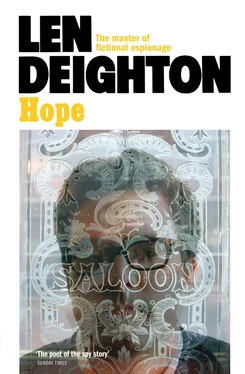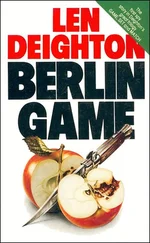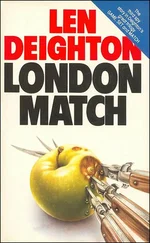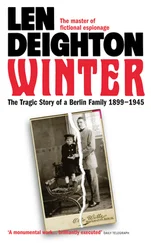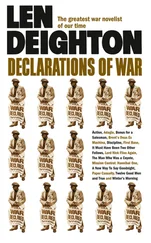‘But the desk didn’t tell you anything about our pal Kosinski?’ I asked, to bring him back to earth.
‘I left that to you,’ said Dicky.
‘George knows his way around this town. He speaks Polish. He might lead us a dance before we get a definite fix on him.’
‘And by that time he could be on a plane and in Moscow.’
‘No, no, no. He won’t leave until he’s done what he has to do. With luck we’ll get to him before that.’
‘Very philosophical, Bernard. Abstract reasoning of the finest sort, but can you tell me what the hell it means?’
‘It means we can’t find him, Dicky. And there are no short cuts except miraculous good luck. It means that you have to be patient while we plod along doing the things that a village policeman does when looking for a lost poodle.’
This wasn’t what Dicky wanted to hear. As if in reproach he said: ‘Last night, when we first arrived, the reception people admitted that George Kosinski had been here in this hotel. So why won’t they tell us where he’s gone?’
‘No, they didn’t say he had been in this hotel, Dicky. They suggested that we try to find him in another hotel with a similar name. It’s on the other side of the airport. It’s a sleazy dump for overnight stays. He won’t be there. It was just a polite way of telling us to drop dead.’
‘I’ll never get the hang of this bloody language,’ said Dicky. He smiled and slapped his hands together in the forceful way he started his Tuesday morning ‘get-together meetings’ when he had something unpleasant to announce. ‘Well, let’s go there. Anything is better than sitting round in this mausoleum.’ He produced his room key from his pocket and shook it so it jangled.
I was tired after doing the rounds of the city. The official line was that the last of the political prisoners had been released the previous year, but for some unexplained reason all the people given to airing political views the government didn’t like were still serving indefinite detention in a labour camp near Gdansk which had been doubled in size to accommodate a couple of hundred extra detainees. Most of my other old contacts had moved away after the big crack-down, leaving no forwarding address, and my enquiries about them had not been met by neighbourly smiles or friendly enthusiasm.
Now I wanted to have a drink and then sit down to a leisurely lunch, but Dicky was a restless personality, ill-suited to the slow-paced austerity of communist society. I followed his gaze as he looked around with pent-up hostility at everything in the hotel lobby. Its institutional atmosphere was like that of a hundred other lobbies in such gloomy communist-run hotels. The same typography on the signs, and the same graceless furniture, the dim bulbs in the same dusty chandeliers reflecting in the polished stone floor, the same musty smell and the same surly staff.
The skittish way in which Dicky nagged his Department into doing his will was less effective when pitted against the ponderous systems of socialist omnipotence. And so Dicky had found that morning, as he tried to press the hotel manager – and individual members of the staff – into providing him with a chance to search the hotel register for George Kosinski’s name. I knew all this because a full description of Dicky’s activities had been provided to me by a querulous German-speaking assistant manager who was placated only after I gave him a carton of Benson and Hedges cigarettes.
‘I’ll have a quick drink, Dicky, and I’ll be with you,’ I said.
‘Good grief, Bernard, it’s eleven o’clock in the morning. What do you need a drink for at this hour?’
‘I’ve been outside in sub-zero weather, Dicky. When you’ve been outside for an hour or two you might find out why.’
‘Thank God I’m not dependent upon alcohol. Last night I saw you heading for the bar and now, next morning, you are heading that way again. It’s a disease.’
‘I know.’
‘And the stuff they call brandy here is rot-gut.’
‘I can’t buy you one then? The barman is called “Mouse”. Pay him in hard currency and you’ll get any fancy Western tipple you name.’
He disregarded my flippant invitation. ‘Make it snappy. I’ll go and get my coat. I didn’t bring an umbrella but perhaps I can shelter under yours.’
When we emerged on to the street Dicky seemed prepared to yield to my judgement in the matter of avoiding a senseless trek to the hotel’s inferior namesake on the other side of town. ‘Where shall we go first?’ he offered tentatively.
‘I heard George was trying to buy a gun,’ I said.
‘Are you serious?’
‘In the Rozyckiego Bazaar in the Praga. It’s a black-market paradise; the clearing house for stolen goods and furs and contraband from Russia.’
‘And guns?’
‘Gangs of deserters from all the Eastern European armies run things over there and fight for territory. It may look law-abiding but so did Al Capone’s Chicago. Keep your hands in your pockets and watch out for pickpockets and muggers.’
‘Why don’t the authorities clear it out?’
‘It’s not so easy,’ I said. ‘It’s the oldest flea-market in Poland. The currency dealers and black-marketeers all know each other very well. Infiltrating a plain-clothes cop is tricky, but they try from time to time. They might think that’s what we are, so watch your step.’
‘I can handle myself,’ said Dicky. ‘I don’t scare easily.’
‘I know,’ I said. It was true and it was what made Dicky such a liability. Werner and me, we both scared very easily, and we were proud of it.
The Praga is the run-down mainly residential section of Warsaw that sprawls along the eastern side of the river. Most of its old buildings survived the war but few visitors venture here. Running parallel with the river, Targowa is the Praga’s wide main street, the widest street in all the city. Long ago, as its name records, it had been Warsaw’s horse market. Now dented motors and mud-encrusted street-cars rattled along its median, past solid old houses that, in the 1920s, had been luxury apartments occupied by Warsaw’s merchants and professional classes.
Now the wide Targowa was patched with drifting snow and, behind it – its entrance in a narrow sidestreet – we suddenly came to the Rozyckiego market. Overlooked on every side by tenements, there was something medieval about the open space filled with all shapes and sizes of rickety stalls and huts, piled high with merchandise, and jammed with people. This notorious Bazaar had been unchanged ever since I could remember. It had drawn traders and their customers from far and wide. Gypsies and deserters, thieves and gangsters, farmers and legitimate traders had made it a vital part of the city’s black economy, so that the open space was never rebuilt.
‘And are you going to buy a gun too, Bernard?’
‘No, Dicky,’ I said as we went through the gates of the market. ‘I’m just going to find George.’
The ponderous sobriety that descends upon Eastern European towns in winter was shattered as we stepped into the active confusion of the market. Women wept, men argued to the point of violence, whole families conferred, children bickered. And scurrying to and fro there were men and women – many bent under heavy loads – shouting loudly to call their wares.
‘Those communist old clothes smell worse than capitalist ones,’ said Dicky as we made our way through the crowds. Noisy bargainers alleviated the bizarre variety of deprivation that communism, with its corruption, caprices and chronic shortages, endemically inflicts. Here, on display, there were such coveted items as toilet paper and powdered coffee, used jeans in varying stages of wear, plastic hair-clips and Western brands of cigarettes (both genuine and fake). Women’s shoes from neighbouring Czechoslovakia were hung above our heads like bright-coloured garlands, while exotic sable, fox and mink furs from far-off regions of Asia were guarded behind a strong wire fence. Elderly farmers and their womenfolk, enjoying a measure of private enterprise, offered their piles of potatoes, beets and cabbages. A solemn young man sat on the ground before a prayer-rug, as if about to bow his forehead upon the rows of used spark plugs that were arrayed before him.
Читать дальше
